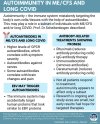Chandelier
Senior Member (Voting Rights)
Altered neurometabolite levels in the brains of people with ME/CFS
Kiana Kothe is a PhD student working with Prof. Zack Shan at the University of the Sunshine Coast on an ME Research UK-funded project using magnetic resonance imaging to investigate brain neuroinflammation in ME/CFS. Kiana recently presented some of her initial results at the annual conference...
 www.meresearch.org.uk
www.meresearch.org.uk
Altered neurometabolite levels in the brains of people with ME/CFS
13 August 2025Kiana Kothe is a PhD student working with Prof. Zack Shan at the University of the Sunshine Coast on an ME Research UK-funded project using magnetic resonance imaging to investigate brain neuroinflammation in ME/CFS.
Kiana recently presented some of her initial results at the annual conference of the Organisation for Human Brain Mapping in June 2025, which was attended by more than 2,000 neuroimaging researchers, and she is currently preparing a research paper reporting her findings. Kiana very kindly recorded a video of her presentation for us, showing her results so far.
In brief, Kiana used previously collected magnetic resonance spectroscopy images to assess levels of a number of neurometabolites in the brains of 48 people with ME/CFS and 52 healthy controls. Neurometabolites are the products of metabolism in the brain, and indicate neural activity.
Of the five metabolites she analysed, levels of two of them were significantly altered in people with ME/CFS compared with healthy controls.
Specifically, glutamine/glutamate concentrations were increased in ME/CFS, while total choline levels were decreased, and these findings suggest the involvement of excitotoxicity (damage to nerve cells), abnormal cellular membrane turnover and neuroinflammatory activation.
In short, these findings provide evidence of neuroinflammation in ME/CFS, and Kiana and the team next plan to track how these neurometabolites change over time while the participants perform cognitive tasks.

